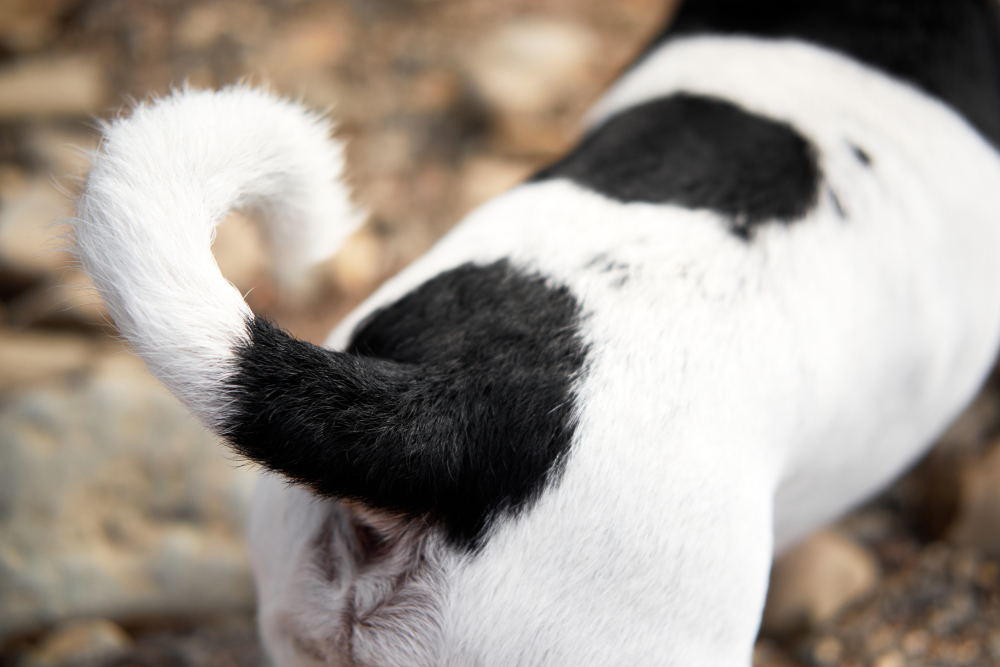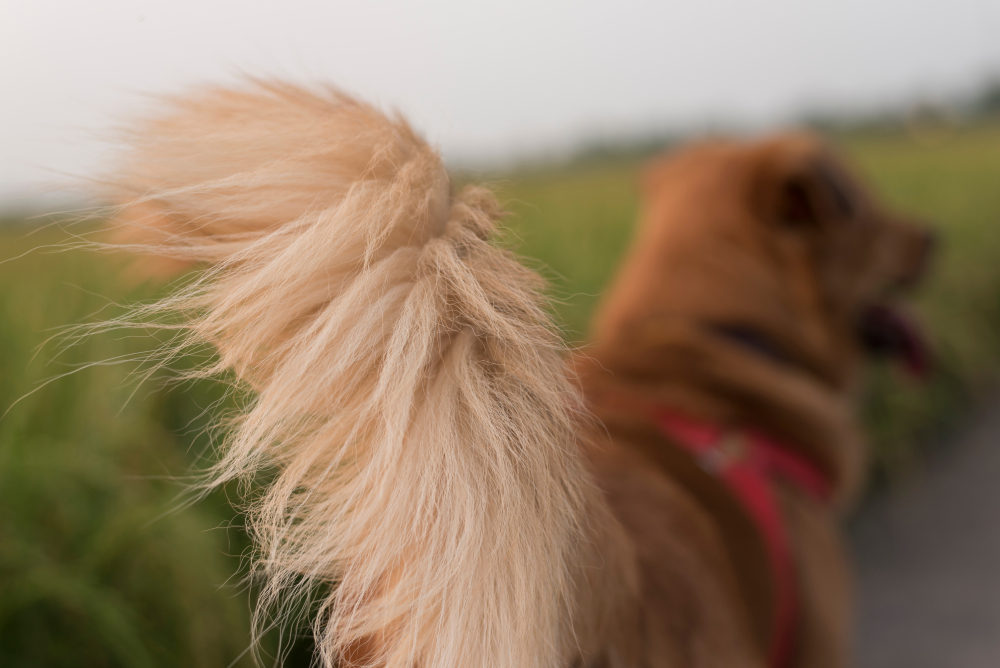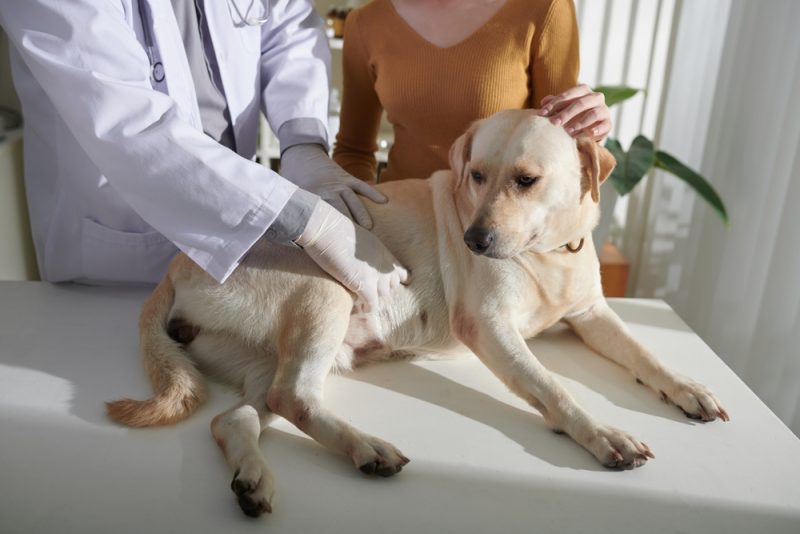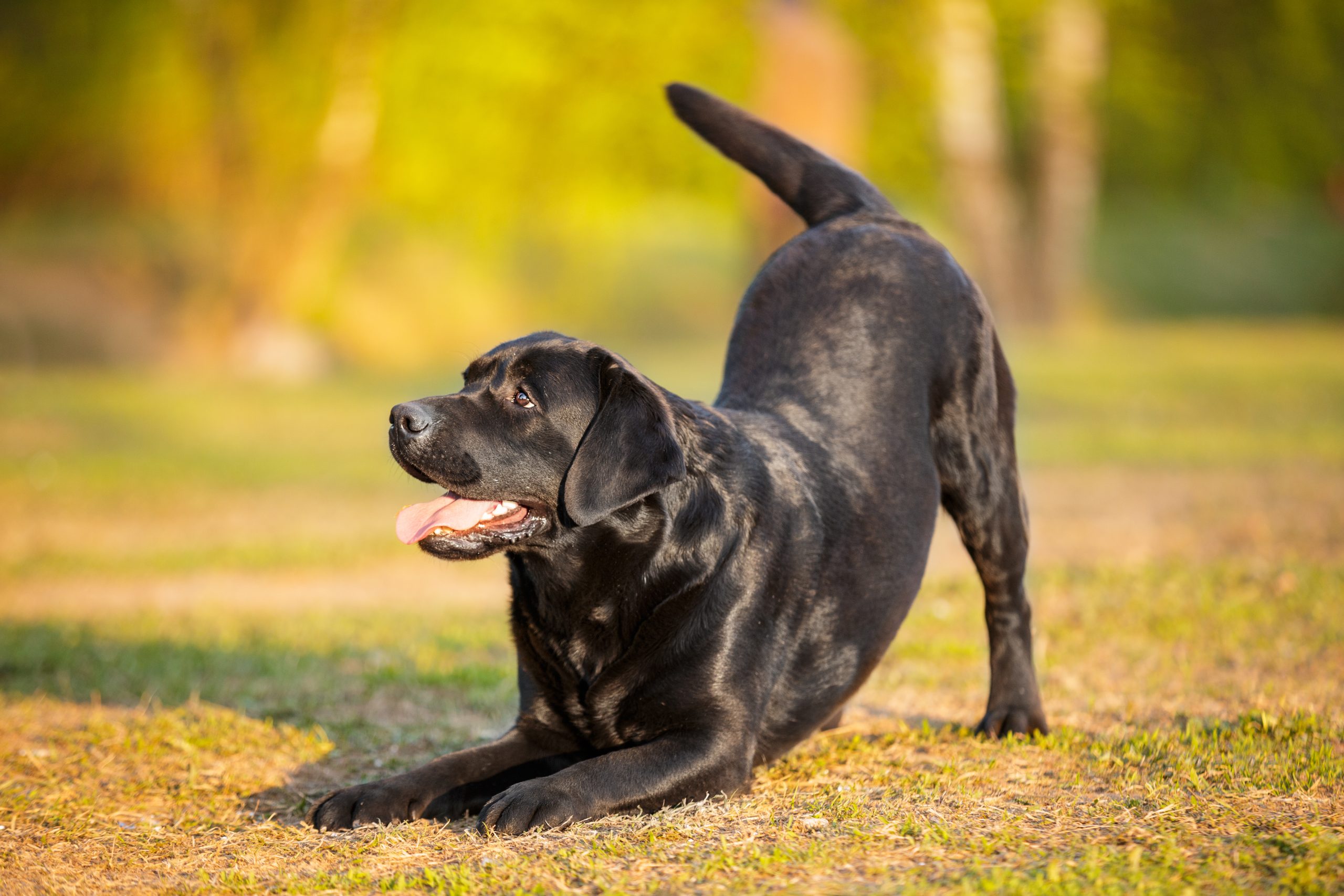Don’t let the name deceive you – Happy Tail Syndrome is not a particularly happy situation. In fact, it can be extremely messy, challenging to treat, and expensive to resolve. One of the main problems in treating this is that it’s not usually a particularly painful condition, so the human is usually having to convince their dog of the problem.
So, what is it?


What Is Happy Tail Syndrome?
If you’ve ever stood beside a happy dog with a very waggy tail, you’ll know that those mini whips can really pack a punch! Flying back and forth at a mile-a-minute, a wagging tail can sound like an urgent knock at the door or the beating of a drum as it whacks against walls and door frames. It can knock things flying from tables, and even bruise the legs of unwary bystanders. And sometimes, this frenetic motion can damage the end of the tail, causing a bleeding and messy tail tip injury, sometimes referred to as ‘Happy Tail Syndrome’.
You may not be aware that the spinal cord does not extend into the tail. At the level of the sacral vertebrae (where the spine enters the pelvis), the spinal cord narrows and branches into smaller nerves in an area called the ‘cauda equina’, as it looks a little like a horse’s tail. There are fewer nerves and muscles the further along the tail we travel, and by the time we reach the tip, there is little more than skin covering the tiny vertebral bones and connective tissue. There is, however, quite a good blood supply.


Why is this a problem?
If a dog damages the skin over the tip of the tail, they often don’t seem to register the injury, continuing to happily wag the wounded appendage, as blood is smeared, spattered, and sprayed around them in a style reminiscent of a Jackson Pollock painting. No sooner does the bleeding stop, the wagging starts again, and the wound invariably opens up.
What Are the Signs of Happy Tail Syndrome?
Most of the time, the first and only sign of this condition will be the disturbing amount of blood that suddenly appears on your walls, floor, and furniture, accompanied by a happy dog with a bloody paintbrush for a tail.
The most frustrating part about tail tip injuries is how small and insignificant they are, particularly compared with the trail of carnage they leave behind. It is usually quite challenging to examine the injury as the tail of a happy dog is difficult to immobilize, as is the tail of a dog that no longer wishes to cooperate.
In some cases, a minor tail tip injury will eventually stop bleeding and heal without any intervention. In many cases, however, the wound will continue to be traumatized, preventing it from closing. Not only will this result in a very messy situation, but it can also lead to further damage, tissue necrosis, or infection. As the injury persists, the dog becomes more aware of it, and will usually bite, lick, or chew at the tail, causing hair loss and further injury.
Although tail tip injuries are often more of a nuisance than a life-threatening condition, they still usually require veterinary treatment, and in many cases, the treatment involves surgery.




What Is the Treatment for Happy Tail Syndrome?
Asking a happy dog to stop wagging their tail is about as effective as asking a fish to stop swimming, and we certainly don’t want to do anything to make that happy tail stop.
One of the biggest mistakes people make is placing their bleeding dog in a confined space – something that would normally be the right course of action for an injured dog. But in the case of a tail tip injury, the ideal place for our dog is away from anything they can hit that waggy tail against. We don’t advise taking them out for a walk, as this will increase the blood flow to the area, but if you have a large space where you can allow them to rest without covering your home in a fetching shade of crimson, this is the best first step.


If the wound is still bleeding…
The first step is to contact your ve. They will be able to advise you more specifically based on your situation.
The aim of treatment is to keep the wound clean, stop the bleeding, and prevent further trauma. It is important to be aware that the more you handle the tail, the more it is likely to bleed, so minimal handling is best.
- Clean the wound with sterile saline by dipping the tail tip into a bowl of solution or using a syringe to flush the area. Avoid cleaning with cloths or cotton wool as this has the potential to cause further bleeding.
- Sprinkle or dip the tail tip in styptic powder (if dipping the tail, pour some powder into a separate container, do not dip the tail into the original pot).
- Place an e-collar (cone of shame) on your dog to stop them from licking or chewing at the tail. If you don’t have one at home, you can fashion one yourself until you can pick one up.
- You might want to order a tail protector to prevent further trauma. This will stop your dog from being able to lick or chew the tail tip, protect it from hitting surfaces, and help keep any bandaging in place.
Should I bandage the tail?
Placing and securing a bandage over the tail tip is a challenge that has plagued vets for many years. The dressing needs to be padded enough to protect the wound and allow it to breathe, but not be too bulky. It needs to be secured firmly to the tail, but be able to be removed regularly to be checked. It is something of an engineering nightmare. We advise against bandaging the tail at home, and if the wound continues to bleed, get your dog to the vet.


If the wound has stopped bleeding…
Resist the urge to clean the wound, as this will likely dislodge the clot and start the bleeding again. Use an e-collar or tail cover to prevent your dog from licking the tail, and leave everything to settle for 24 hours. If there has been no further bleeding, carefully examine the tail to assess the damage. We recommend making an appointment for a check-up with the vet in case further treatment or antibiotics are required.
You should leave the collar or tail cover in place for 3-5 days to make sure the wound has healed; longer if your dog is still trying to lick it.


Will My Dog Need Surgery?
If a tail tip injury does not heal with conservative methods of treatment, your vet may recommend surgical treatment. This tends to be in the form of partial tail amputation. To have the greatest chance of success, the amputation should be made approximately one-third of the tail length from the base.
Why such an extreme measure?
Simply suturing the wound will leave us in no better a position than we are already in – trying to manage a fresh wound on the end of the tail, which will almost certainly result in the need for another surgery.
If too little of the tail length is removed, the amputation wound may be just as susceptible to damage. The remaining tail needs to be short enough that it won’t be hitting walls and objects while it is healing.
It may seem like an extreme solution to a relatively small injury, but it is sometimes a necessary one if all other attempts to heal the wound have failed.


How Can I Prevent Happy Tail Syndrome?
Unfortunately, this is one injury that is difficult to predict or prevent. Some breeds are more predisposed to tail tip injuries, particularly those with long, slender tails such as Dalmatians, Pointers, and Greyhounds, and exceptionally strong, waggy tails like Labradors and Springer Spaniels. Working dogs that are kept in kennels are also more likely to get tail tip injuries as they hit their tails on their kennel walls.
Tail docking is sometimes practiced to prevent these injuries from happening, but the ethics of cutting off the tail of a 3-day-old pup to prevent a possible injury is up for debate. If you have a particularly waggy dog, the best thing you can do is make sure they have plenty of space to wag that happy tail.


Is Happy Tail Syndrome Related to Swimmer’s Tail?
Swimmer’s Tail is a muscular condition more accurately known as acute caudal myopathy, and sometimes (incorrectly) called a broken tail. It refers to a condition where the muscles that control the tail become acutely painful and fatigued, resulting in a tail that is held in a dropped position, with little or no movement.
There is no relationship between Happy Tail and Swimmer’s Tail, apart from the fact that both are more likely to be seen in particularly waggy dogs.


Final Thoughts
Happy Tail Syndrome may be an injury most often seen in happy dogs, but it does not make for happy dog owners. Although the injury itself tends to be quite minor, the mess it creates, combined with the difficulty in getting it to heal, means that it can be a real nightmare for the dog and parent alike. Conservative methods like protecting the tail against continued trauma can be effective, but it is not unusual for this seemingly minor injury to result in a partial tail amputation.
If your dog has injured the tip of their tail, it is best to seek veterinary help sooner rather than later to maximize your chances of a smooth recovery for your happy canine companion.
Featured Image Credit: Hollysdogs, Shutterstock






